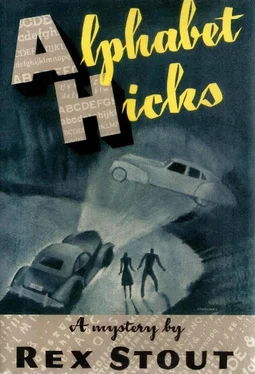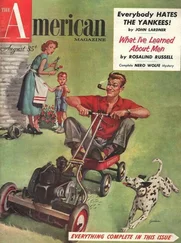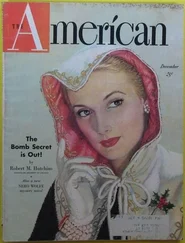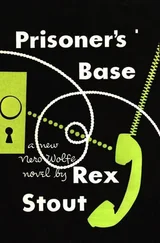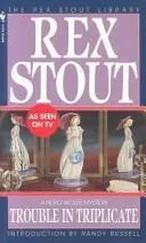When Hicks arose to go she accompanied him to the door, and he drew his finger back from the elevator button to say:
“By the way, that picture you gave me yesterday. That photograph of yourself. Have you been passing them around?”
“Not indiscriminately. Why?”
“I just wondered. I happened to be in Brager’s room up there, and I noticed he has one.”
“Oh.” She frowned. “That could be funny if anything could be funny now. He asked for it and I gave it to him.” The frown tried to be a smile but didn’t make it. “He has it in view? Then he doesn’t adore me any more. A fresh calamity. If he did he would keep it in a secret drawer. Are you by any chance asking if I have bestowed favors on Mr. Brager?”
“Lord, no,” Hicks said hastily.
“I assure you I haven’t. At my age adorers get to be more of a rarity and things like pictures go much more cheaply.”
“You even gave me one,” Hicks agreed, and pressed the elevator button.
On the street, he walked around the corner to where he had parked the car. Driving downtown, he considered taking it to a garage on First Avenue, but decided to save a dollar by leaving it on the street, and spend the dollar on a bed he knew to be vacant on the floor above his own. Not only that, he would transfer George Cooper to the upper floor, if necessary by portage. That mattress was his own property, a good mattress being one of the few items of impedimenta which, in his blueprint of life, a free man might reasonably encumber himself with.
But he didn’t lie on it that night.
Leaving the car at the curb, he mounted the two flights, let himself in with his key, switched on the lights, and saw an empty bed. He stared at it a moment, then tramped out and down to the next floor. No George Cooper was in the bathroom. He returned upstairs, stood scowling at the bed, decided that the occasion required the eating of chocolates, crossed to the bureau and opened a drawer — and the scowl became ferocious.
“Good God,” he said aloud in accents of consternation, “the damn louse stole my candy!”
He sat on the edge of the bed and considered the situation. It had already been sufficiently cloudy and complex, what with three plausible theories regarding Mrs. Dundee’s trouble and at least four regarding the murder, and now it was chaotic. If Cooper was merely a guy with a screw jolted loose by shock and grief, nothing was altered by this latest development besides the candy, but if theory number four on the murder was the true one, it was quite a different matter. There might be a second murder before the night was out.
It might already have happened... it might be happening now...
He went out and down the stairs to the street and climbed in the car. The dashboard clock said half past one as he turned north on First Avenue.
Out in the country the September night was cool and the orchestra of crickets and katydids applied itself to its intricate lovely symphony — or its infernal racket, to those who felt that way about it — with an urgency that forecast the imminence of an early frost to chill the musicians into silence.
The windows of the office in the laboratory building had been closed to keep the night air out, so that the cricket concert came only faintly to the ears of the three men who sat there around midnight, but it appeared from the expressions on their faces that they would not have been attentive to it in any case. Herman Brager looked exasperated and peevish, Ross Dundee stubborn and truculent, and R. I. Dundee about ready to explode.
He did explode. He pushed the record-playing machine away, shoved aside stacks of sonograph plates, and pounded the desk with his fist.
“It’s a damned farce! I’ve spent twenty years of my life building this into one of the soundest and most successful businesses in the country, and this is what I’ve come to! You don’t like it, do you? My God, neither do I! I’ll repeat it and keep on repeating it, my own wife selling me out, and one of you helping her do it! Shut up! And stealing the evidence I got of it! It wouldn’t surprise me if you were the both in on it! Not a bit! Not a bit! By God, I’ll clean it all out, this place and the factory and the office, the whole works, and start over again!”
He sat trembling.
“I can resign,” Brager said in a strained voice. “That is all I can do with dignity. I can resign. I resign.”
“So can I,” Ross said. His face as white; his eyes focused on his father. “I guess Mother was right, I shouldn’t have gone to work for you. We should both have known better. We might have known something impossible would happen. But I told you this afternoon — even when you lose your temper you shouldn’t say things that are absolutely crazy.”
Dundee got up and walked to a window and stood there with his back to them.
“Everybody loses his temper once too often,” Brager said. “I don’t dare lose my temper. I haven’t lost my temper for thirty years. All I can do and keep my self-respect — I can resign.”
There was a long silence but for the outdoor orchestra, which no one heard. Finally Dundee turned around and faced them.
“Facts are facts,” he said harshly.
Brager shook his head. “Not in science,” he declared. “A fact is a phenomenon observed or recorded by an imperfect instrument.”
“Bosh! A sonotel may not be perfect, but it doesn’t lie. As you do, or my son does, or both of you. I heard that record, and I heard my wife’s voice. That is a fact.”
Brager’s lips tightened. “I will not lose my temper. I will repeat, I know nothing of that record. Your son may lie about it, I don’t know. A boy will do many things for his mother. But try to be reasonable about it, Dick. I am not in his position, am I? Why should I do such a thing?”
“I don’t know, but I can guess. I once heard you talking to my wife.”
“I have often talked with your wife.”
“I know you have. This time you didn’t know I was there. I listened because it was amusing. It was amusing then. Nor did I resent it. I never have resented it because other men have found my wife attractive and desirable, why the devil should I? But if you ask me why you should lie for her, or even why you should conspire with her to sell me out, I say I can guess why. I tell you straight, Herman — where are you going?”
It was not Brager who had moved, but Ross. He was on his way to the door. With his hand on the knob he turned:
“I’m leaving.”
“You’re staying here till we settle this.”
“No. I’m leaving. I was going to go without saying anything.” Ross’s jaw quivered. He clamped it shut and went on through his teeth: “I didn’t say it this afternoon, but I’ll say it now. You’re my father, and I’ve known you all my life, and I think you’re trying to get rid of Mother, and I think that record is a fake and you did it. I didn’t want to say it!”
He was out and the door was closing behind him. Dundee started for the door, but Brager, surprisingly quick, intercepted him and caught his arm.
“Let him go, Dick,” Brager said. “Let the boy go and cool off.”
Ross did literally cool off, physically if not mentally. The air outside was chilly under the stars, and in the black darkness of the woods, where he halted on the bridge over the brook, he shivered his reaction to it. He stood there as if he were listening to the brook but actually didn’t hear it. He was thinking about his father and mother. All his life he had been emotionally aligned with his mother, he was aware of that, and regarded it as proper and natural, but that only made it the more imperative to keep his faculties free and his reason clear in a situation like this. Though it was hard to see how any further consideration of the facts could help any. In the past few days he had done about all the considering he was capable of. Besides, his mind wouldn’t stick to it; it kept flying off.
Читать дальше
